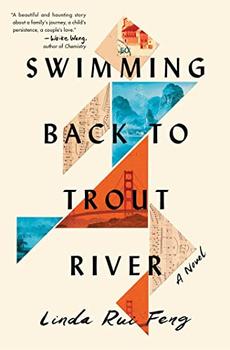Summary | Excerpt | Reviews | Beyond the Book | Readalikes | Genres & Themes | Author Bio

Two Children of Trout River Two Children of Trout River
THE TRAIN THAT WAS DELIVERING Junie to Trout River was just pulling out of the station and gathering speed, and already the compartment was filling up with cigarette smoke and the gregarious sound of sunflower seeds being cracked open. This was 1981, when trips traversing the length of China took days, and the passengers, having waited for that first lurch of the train, now sprang into action. They poured each other hot water for tea from a communal thermos stabilized inside a metal ring beneath the window where Junie sat on the lap of her mother, Cassia.
Cassia too was set into motion in her own way. She began to tell Junie over and over again to listen to her grandparents, as if some urgent and collaborative task awaited them at the end of the journey. The cadence of that litany—listen to them, they know what's good for you—merged with the rhythmic rattle of the train until the two sounds became indistinguishable. To Junie, who was five and wasn't otherwise prone to premonitions of loss, it seemed as though something unprecedented was about to happen, and it made her almost afraid, until the scenery outside the window began to change. Junie had never seen so many dewy rivers and paddies, or so many trembling shades of green, and they exerted a tug on her that the snowy landscapes of her birthplace had never done.
Throughout their trip, passengers in adjacent bunks, noticing Junie's empty trouser legs, asked Cassia about them, believing themselves to be striking up a conversation with a somber woman who needed company. But Cassia pretended not to hear them, and after this happened a couple of times, no one asked again.
She knew that if her husband Momo were here, he would never ignore these proddings. He always educated his inquisitors, sometimes even chided them in outbursts, saying something like, Many forms of human locomotion are possible.
Momo was a believer in possibilities. That was the best thing about him, but also the worst.
Earlier that year, Momo left for graduate school in America, and it was understood that in a year or two Cassia would follow. The night before his departure, he managed to borrow a violin that someone, somewhere, had made into a size that fit a child's fingers.
It seemed to Cassia that an absurd amount of craft went into making such a miniature instrument—something that even for adults was a luxury, and even contraband not long ago, during the Cultural Revolution. The fact that it was made in the first place presumed a kind of child prodigy who would, against all odds, make all this arcane skill worthwhile.
But Momo didn't think it absurd, and his impending absence from Junie only made him more determined to start her on music—not just any kind of music, but the kind that had shaped him in his university years in a way Cassia didn't fully understand. In the wee hours of the morning before his departure, he insisted on giving Junie a last-minute violin lesson. After some cajoling and a tussle, it ended in a tantrum and tears. Cassia thought his desperation pitiable—what had he been thinking?? But she also knew she could never match his aspirations for their daughter, who was born with nothing below her knees—no tibias, no feet. Where her legs ended, the skin was smooth and the shapes perfectly rounded and unapologetic.
But Cassia rarely touched her there.
Unlike Momo, right now, she was determined to accomplish something very practical: to deliver Junie into the hands of her in-laws, to ensconce Junie in Trout River where Momo had grown up, and to make herself dispensable as a guardian. Whatever Junie would become—and Cassia could not fathom it any more than she could her own future—it had to start with this.
Outside the rattling train compartment, the gleaming railroad tracks merged and separated like undulating steel snakes. She pressed her mouth close to Junie's ear, as if she was sharing a conspiracy with her: "Remember that time when your dad was little and Grandma thought a tiger snatched him up?"
.
Your guide toexceptional books
BookBrowse seeks out and recommends the best in contemporary fiction and nonfiction—books that not only engage and entertain but also deepen our understanding of ourselves and the world around us.